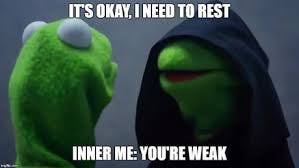Welcome, budding polyglot! Anyone who has ever experienced real burnout knows it is worth mitigating if at all possible. The goal of this post will be to give you the strategies necessary to continue on even when you are ready to throw in the towel. Do not let burnout prevent you from reaching your language goals.
Recover
A leading cause of burnout is a refusal to recover. I understand why this happens, but here is why I would avoid it, if I were you. Your brain is just like any other part of your body, when you use it and press it, it needs recovery time. 7-9 hours of sleep every night, a good diet, and exercise are amazing ways to give your brain the treatment and love it deserves. Love your brain and your brain will love you.
The most underrated part of recovery time is it usually comes with the bonus effect of enhancing the next session. Concepts that were difficult suddenly make sense, words that were impossible to remember are at the top of the recall list, and voices that were impossible to understand become the go to because they seem simple now. One of the main reasons people struggle with learning and growing in just about any field is because they refuse to rest. I get it, I have done it many times, that is how I learned what is more effective and efficient.
As far as when to know it is time for some rest, here are some indicators:
You can't remember any words even if you studied an hour ago
You are struggling with comprehension in your native language
You keep trying to read but only make it through one paragraph (4 times)
You put a metal lid in the microwave because you couldn't find the cover and didn’t want to make a mess (this is one of the things that happened to me)
If you are experiencing anything similar to the above, treat your brain to some much needed R&R and see how quickly you get ahead when you come back to it the next day. Fighting against the urge to pick up the phone and do a quick Duolingo or Pimsleur or Memrise lesson can be difficult, but it is worth it to walk away from time to time. Let your brain digest and store information before you continue piling it on, you will see the difference almost immediately.
Explore New Topics
Switching it up is one of the easiest ways to become reinvigorated in just about anything, language learning is no exception to this rule. I am a huge proponent of using things you are interested in to enhance and accelerate your language acquisition. However, it doesn't always need to be something in which you already know you are interested. Exploring new topics is possibly one of the best ways to avoid/mitigate burnout as it allows you to not only learn new words in your target language, but learn new skills, techniques, or information about anything you read, see, or hear.
In my opinion, the easiest way to do this is to start diving into tangential topics to those on which you are already focused. Have you been reading about hiking in different countries using your target language? Look into some camping ideas or articles about backpacking trips. Been checking out @BowTiedHalibut and @BowTiedSmilodon and what they have to say? Read about the wilderness in other countries and in other languages. Read about the wildlife and plant life in the countries that speak your target language, this will be important for a later tip.
The advantage of being an avid reader is that it allows you to discover new and exciting topics that could become things about which you are passionate. I always recommend reading for this reason, but also because, if you are here reading this, you are likely a forever student. Developing the ability to be a forever student will pay off for a very long time; and coupling this ability with a second language opens even more doors. While I always recommend focusing on things you are interested in, it is worth branching out from time to time in order to bring in new stimulus and potentially open your eyes to an entire world you previously about which you previously knew nothing. Discovering new topics is by far one of the easiest ways to mitigate burnout as the stimulus and information, outside the language itself, is consistently new.
Switch it up
Breaking up a routine is a great way to get out of a rut and avoid running out of steam. A challenging aspect of learning anything is it can be easy to become complacent in the types of stimulus input that is utilized. If you like to read, it can be easy to just read all the time. If you love podcasts and music, it can be easy to just listen all the time. However, after a certain amount of time it becomes almost necessary to switch it up. If you've spent the last week reading, but you haven't listened to anything, spend some time working your auditory comprehension. If you spent the last month binging new shows in your target language, spend some time writing about what you saw and what you can remember. Changing up the input can give the portions of the brain a much needed break.
In general, I would always encourage a healthy mixture of stimuli, however I also know I preach "do what works for you" and I think that the latter is more important hierarchically. Yes, you should mix up the material and format you consume it in, but not at the expense of losing your desire to continue learning. If you really don’t want to or can't switch up the input, then just take a day off; and when you take that day off, you should travel.
Travel
Something I have never quite understood is that people will learn a language just to not visit the places where that language is spoken. If you have the opportunity and ability, I implore you to spend more time traveling. The amount you can learn from people around the world, the ways they live, the things they prioritize, and the ways they communicate are endless. But if that doesn’t entice you, the inverse is also true. You have so much to teach, but it is impossible to do that without making connections. Spending time learning a language for your own improvement and health is wonderful, but it is incomplete without travel.
Many people have a misconception that travel will change everything about how you view things. This is simply not true. For some, I am sure it happens. Personally, it made me more steadfast in my convictions because it challenged them. Being afraid to challenge your belief systems is proof of a weak belief system. All I ever got out of travel was an expanded worldview, a clearer and more comprehensive perspective, and some amazing lifelong friends and memories.
When I first lived in Belgium there was a kid in my class who HATED me. I could not for the life of me understand why, until 8 months later. By this time he had grown accustomed to having me around and had even begun inviting me to hang out at some parties with him. The more we spoke the more he warmed up. Three months later I was asking people to sign a page in a book for me (yearbook style, for the memories), and he asked if he could write in it. When I saw what he wrote I couldn't help but be choked up, "When you first came here, I hated Americans. Now that I've actually met one, you've changed my mind. Thank you."
At the end of the day perception is reality. For the vast majority of people in any given country all they have is what is depicted in media to go off and judge other nations. The US is no exception to this rule. If you don't believe me, check Twitter, there are millions of examples of people making baseless accusations and wild assumptions about people they've never met and likely never will meet.
Ask yourself, is what's portrayed by the media really the perception you want people to have of you and your country/nation/language/identity? For me it's simple, I am my own best ambassador. If people have a misperception about me because I am associated with x identity, I can easily clear that up simply by interacting with them and treating them well. It might not change their perception of the group as a whole, but at least they will be more likely to give grace to the next person. If it turns out the next person is also decent, or even good, then more grace will be allotted. Soon grace and understanding abound. Though, in order for that to happen a lot more language acquisition and a lot more traveling would need to take place. But hey, that's why we are here!
Conclusion
When getting started on a new language it can be very easy to overdo it. The excitement of picking up something new, the thrill of setting a foundation to build on, learning short phrases in the first week, all of it can lead to a desire to keep going. This is a good thing, but it is important to keep it in check as much as possible. Especially if you are working on the 4th or 5th language. One of the last things I want for anyone is for them to get to B2 level then burn out and stop altogether.
Becoming bilingual is difficult, but you can do difficult things and be great. So go do difficult things and become great. Here I’ve given you some of the tools, but in the end, there is no comprehensive guide, no tips or tricks to carry anyone across the finish line. Language acquisition requires time, effort, and consistency. That said, it is something that anyone of any age is more than capable of accomplishing. I’ll be here rooting for you and watching your progress.
For more content find me on Twitter or Instagram. I look forward to seeing everyone’s progress in the months and years to come.
Disclaimer: When I'm talking about burnout I'm talking about people who either have full time jobs, kids, AND are working on languages 3 hours+/day OR people without kids treating languages like their babies. 1-2 hours/day will not cause you to burnout.






